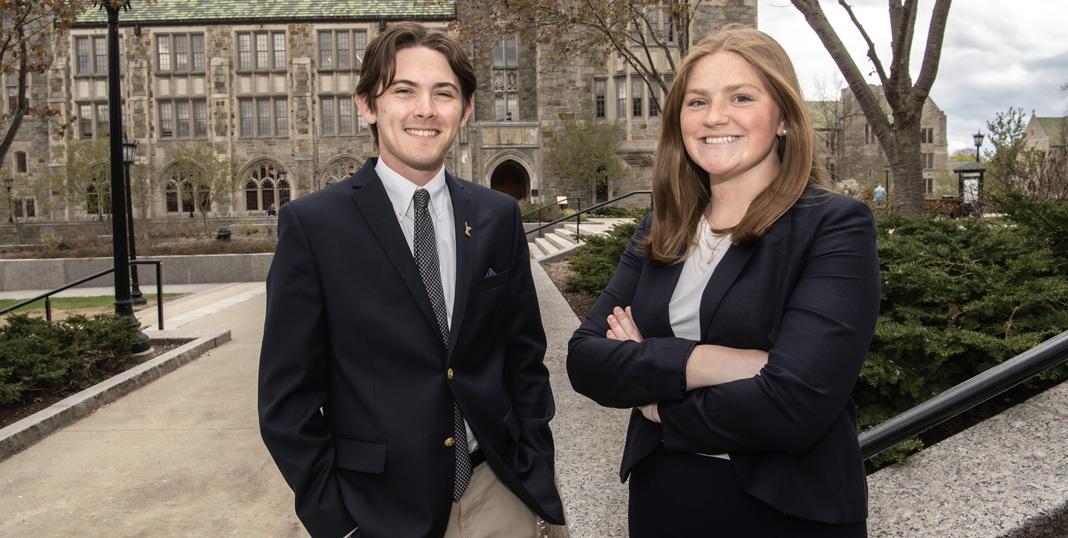
Adaptability, resilience
For a self-proclaimed “people person,” Jonah Kotzen ’24 has spent a lot of the last year examining fish skeletons. Since the fall of 2022, the biology and classical studies double major has worked as a research assistant for Associate Professor of the Practice of Biology Christopher Kenaley, studying different species of centrarchids—known as sunfish—to better understand how their jaws have evolved to help them survive in different habitats.
At first glance, this research might seem unrelated to Kotzen’s role as the president of the Undergraduate Government of Boston College (UGBC), which is all about working with BC students, faculty, and administrators. But for Kotzen, the common thread is adaptability.
“I’ve experienced a lot of change in my life, and it has made me adaptable and resilient,” Kotzen explained. “Just as that helps me connect with people and be a good advocate, it also makes me appreciate how other animals have evolved to fit the environments around them.”
Kotzen grew up in Palm Beach County, Fla., as the fifth of seven half-siblings. His parents both had stable careers, but they moved often and he split time between their houses, never living in a single place for more than four years. Amid these changes, he was also learning to support his brother Jonathan, who has a genetic disorder called Fragile X syndrome.
In 2015, when Kotzen was in middle school, he was diagnosed with Stevens-Johnson Syndrome, a rare autoimmune condition that affects the skin and the eyes. He nearly lost his vision, but thanks to medical care, he made a full recovery. It was this experience, despite its challenging nature, that sparked his interest in medicine and biology.
“The autoimmunity I’ve faced propelled me to become interested in the field of medicine,” he said. “I wanted to understand what I was going through, but I also wanted to be able to help others who were going through similar things.”
At Boston College, he quickly found ways to give back, both within the world of medicine and on campus. In his first year, he started volunteering with an organization called Boston Community Pediatrics, coordinating weekly online reading sessions for underserved children in the Boston area. He also won election as a UGBC senator, and as a sophomore, he joined the senate’s Council for Students with Disabilities (CSD).
“It was through disability advocacy that I really found my voice,” Kotzen said. “I grew up educating my friends about my brother’s condition and his needs, so to play a role in doing that for others at BC is incredibly important to me.”
During his time as the CSD’s policy coordinator and chair of the UGBC’s Intersectionality Committee, Kotzen worked with administrators to expand Eagle Escort’s services and the number of wheelchair-accessible vans on campus. He also collaborated with BC Athletics to add closed captioning to the videos that play at football games, so students with hearing impairments could follow along.

Jonah Kotzen with UGBC VP Meghan Heckleman.
He was proud of these achievements, but he wondered if he could do more. In his junior fall, he approached Meghan Heckelman ’25, then the director of UGBC’s Student Initiatives, to ask if she’d run alongside him for the vice presidency.
“Meghan had a lot of experience on the programming side, and I had experience on the policy side,” Kotzen said. “I think we’ve made a good duo because we know what it takes on both sides.”
Running on a four-pillar platform—acceptance, academics, activity, and adjustment—Kotzen and Heckelman won election as president and vice president in April 2023. Since then, they’ve accomplished several of the goals they campaigned on, including the integration of LGBTQ+ support services into the Thea Bowman AHANA and Intercultural Center, the distribution of funding for laundry costs to 100 students in the Montserrat Program, and a partnership with BC Libraries Digital Scholarship to create a campus navigation app for students with disabilities.
“From the beginning, one of our mottos has been ‘medium-sized, pragmatic steps,’” said Heckelman, a Lynch School of Education and Human Development student. “It’s not the catchiest slogan, but it’s because of our persistence and willingness to collaborate that we’ve been able to secure these resources.”
At a large university like BC, effecting change involves steady relationship building, which Heckelman views as one of Kotzen’s fortes.
“One of Jonah’s biggest strengths is his ability to connect and build bridges between people from different backgrounds, both within UGBC and with students and administrators outside of it,” Heckelman said.
Part of the reason Kotzen is so involved may have to do with the breadth of his academic and extracurricular interests. Outside of UGBC, he is the founder of BC’s first-ever Classics Club, co-chair of the Resident Hall Association’s Student Programming Council, and a member of the Alpha Sigma Nu honor society. He is also actively involved in Boston College’s Hillel chapter and the Jewish community on campus.
“I’m leaving college more literate in so many different things,” Kotzen said, reflecting on his extracurriculars and his double major. “I feel like I’ve become more well-rounded not only academically, but as a person. And ideally, that’s what a liberal arts education does.”
After graduation, Kotzen plans to take at least two years to pursue research in organismal biology before he applies to medical school. As the end of his presidency and his BC experience approaches, he is grateful to have found a place that feels like home. At the same time, he’s excited to see what the next change brings.
“It’s really the people—UGBC members, friends, faculty, administrators—who have defined my experience at BC and made it possible,” Kotzen said. “I’m so thankful for all I’ve been given, and I’m ready to use the lessons this community has taught me to continue to grow and evolve.”
